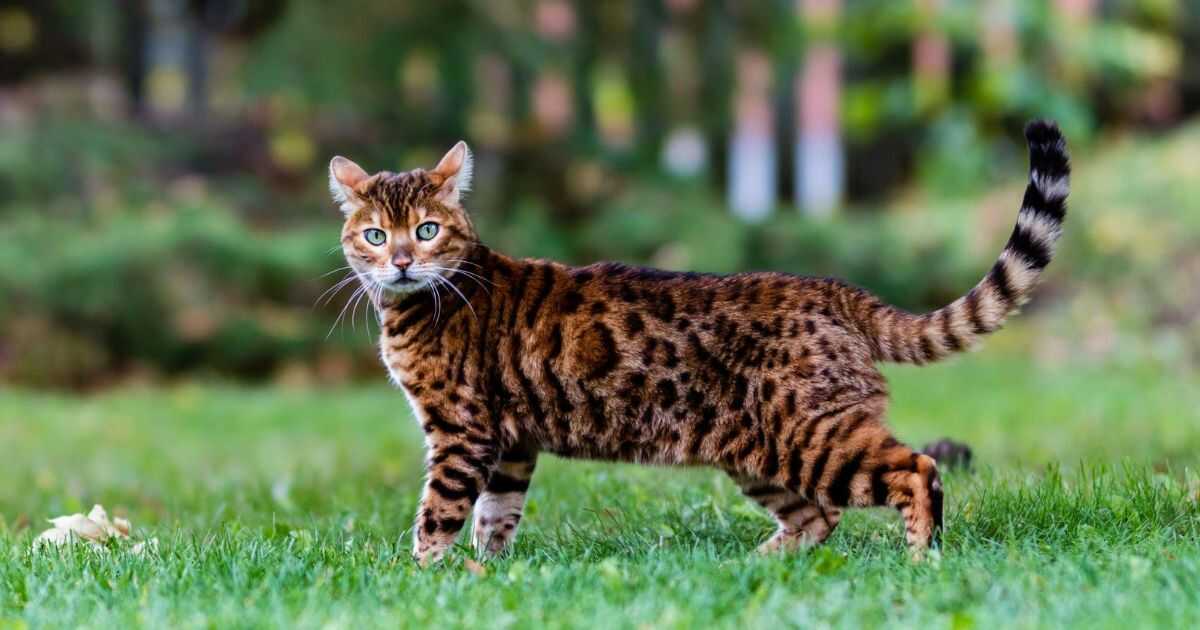
Bengal cats are an increasingly popular breed of domestic cat. They were initially bred from hybrid cats, primarily to create a new and unique pet that mirrored the wild Asian Leopard Cat (Prionailurus bengalensis). They are larger than a traditional house cat and boast stunning coats with vibrant markings.
Bengal cats have become a beloved pets for many households due to their superb personalities, loyalty, affectionate nature, and intelligence. If you’re considering getting a Bengal cat or just want to learn more about them, this blog post will cover all the important background information on the breed and tell you everything you need to know about these beautiful cats.
Table of Contents
- What is a Bengal cat
- Bengal cat pictures
- History
- Characteristics
- Bengal cat care
- Bengal cat health
- Where to get Bengal cats
- Frequently Asked Questions
What is a Bengal Cat?
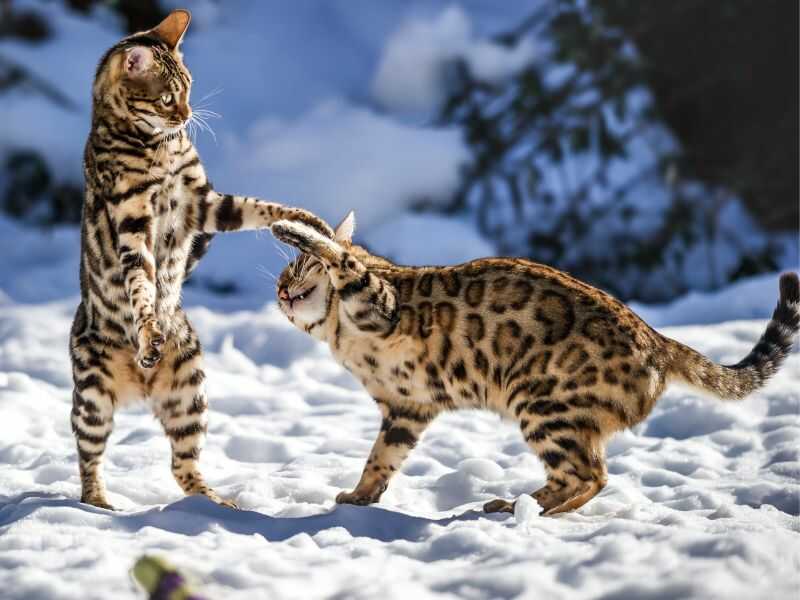
A Bengal cat is a domestic cat breed that was developed to look like small wild cat. Bengals have a distinctive leopard-like appearance, with large spots and rosettes on a light background, and are one of the most popular breeds of house cats. Bengals are known for their intelligence and playful nature and can be trained to perform tricks and even walk on a leash.
In addition to their striking looks, Bengals are known for their affectionate personalities and high energy levels. They tend to get along well with other cats, dogs, and children.
Bengal cats require a lot of mental stimulation in order to stay happy and healthy, so they often require a lot of interaction with their owners or toys.
Bengals are not hypoallergenic, and they shed heavily. They also require regular grooming due to their long fur, which can become matted if not cared for properly. Bengals are usually quite expensive, but the cost is worth it for those who want a beautiful and unique cat that is both loyal and loving.
Bengal Cat Pictures
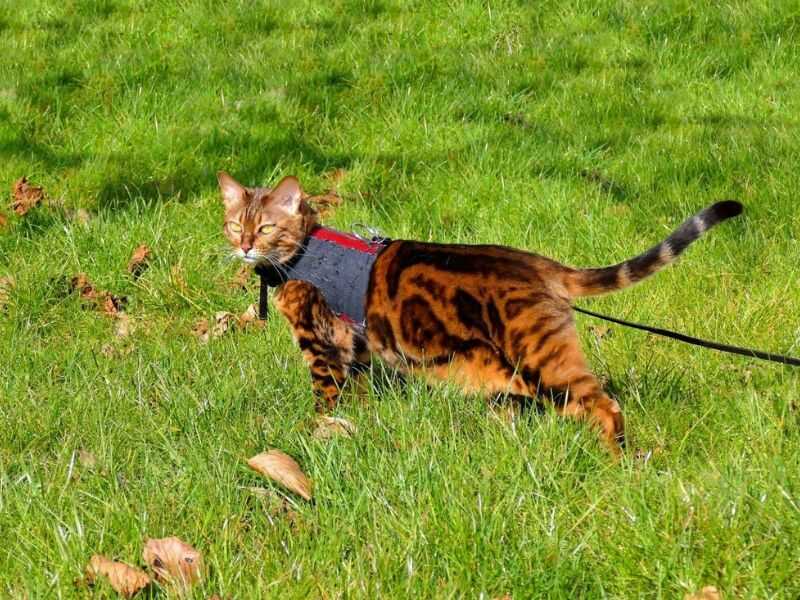
Bengal cats are one of the most popular cat breeds, and it's easy to see why with their beautiful markings. Bengal cats come in a variety of colours, but the most popular is the brown Bengal.
If you're thinking about adding a Bengal cat to your family, be sure to check out our collection of Bengal cat pictures. You'll be able to see how stunning these cats are and get an idea of what they look like in real life.
And if you're still not convinced that a Bengal is a right breed for you, be sure to read our complete guide to the Bengal breed. We discuss everything from temperament to health concerns so you can make an informed decision about whether a Bengal is right for you.
History of the Bengal Cat Breed
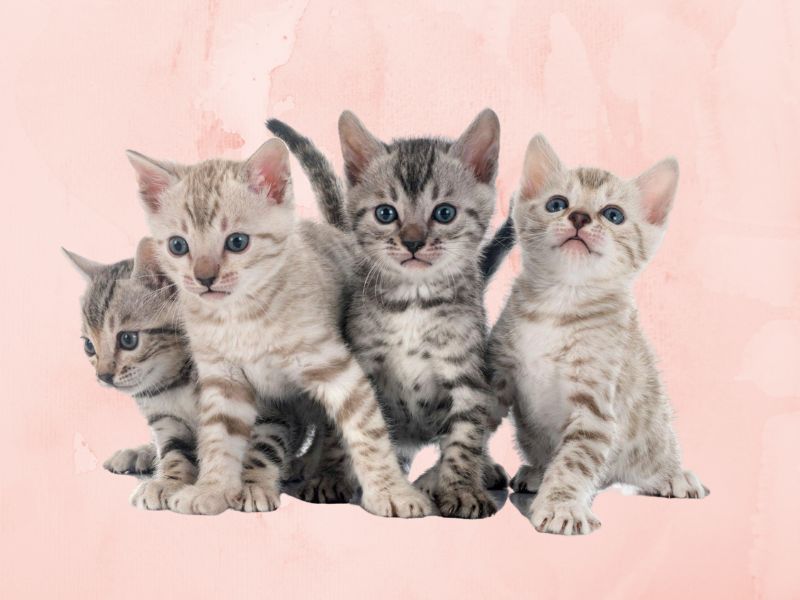
The Bengal cat is a relatively new breed that was developed in the 1980s. The Bengal cat is a hybrid of the Asian leopard cat and the domestic shorthair. The Bengal was originally developed as a house pet, but it has since become popular as a show cat.
The Bengal is known for its leopard-like spots, which are usually brown or black. The coat of the Bengal is short and sleek, and the spots are evenly distributed over the body.
The Bengal is an active and playful breed, and it enjoys climbing and jumping. Bengals are also known for their intelligence and their ability to learn tricks. Bengals are gentle cats, and they get along well with children and other pets.
Bengal Cat Characteristics
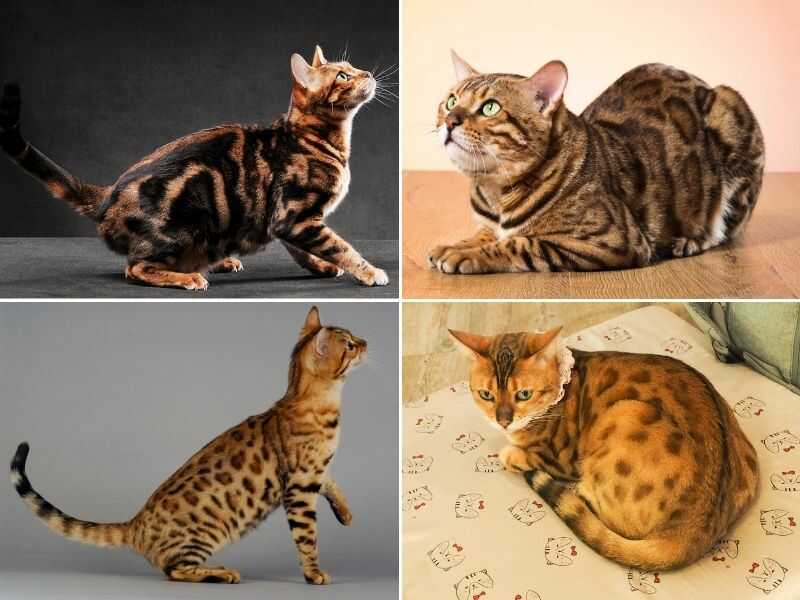
Of all the beautiful cat breeds in the world, the Bengal cat is truly a standout. With their striking leopard-like spots and impressive athletic abilities, Bengals are definitely not your average house cat!
If you're thinking of adding a Bengal to your family, it's important to learn about their unique characteristics so you can be prepared for life with this special breed.
Bengals are extremely active cats and love to play. They are curious about nature and love to explore their surroundings. This can sometimes get them into trouble, as they may climb on things that are off-limits or try to escape from the house. It's important to provide Bengals with plenty of toys and activities to keep them occupied, or else they may become bored and destructive.
While they can make great pets for families with children, Bengals may not be the best choice for homes with small animals such as rabbits or guinea pigs. This is because Bengals have a strong prey drive and may view smaller animals as potential targets.
If you have other pets in your home, it's important to monitor introductions closely and make sure everyone gets along before leaving them unsupervised together.
Bengals are generally healthy cats, but there are a few health conditions that are more common in this breed than others. These include hip dysplasia, patellar luxation, and respiratory problems. Be sure to discuss any health concerns with your veterinarian so you can be prepared if your Bengal does develop any of these issues.
Bengals are also known for their intelligence, and they can be easily trained to do simple tricks. They may even learn how to use the toilet or open doors! With their active personalities and smarts, Bengals make great companions for those who enjoy an active lifestyle.
Bengal Cat Care
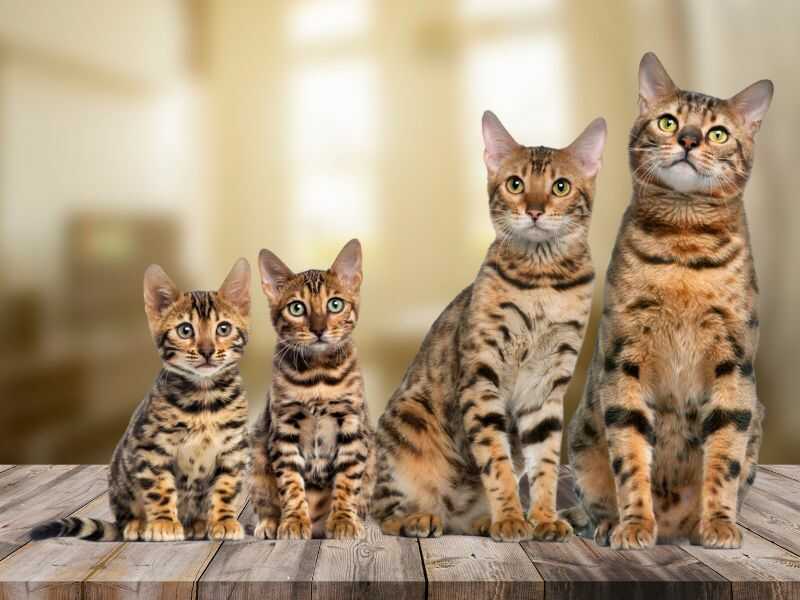
Assuming you would like a care guide for Bengal Cats:
Bengal cats are relatively easy to care for. They are an active breed and require plenty of exercises. A bored Bengal can become destructive, so it is important to provide them with plenty of toys and playtime. Bengals also enjoy climbing, so a cat tree or cat shelves are recommended.
Bengals are known for being vocal cats. Some people find this charming, while others may find it annoying. If you think your Bengal's meowing is excessive, try training them with positive reinforcement to quiet down when asked.
As far as diet goes, Bengal tigers require a high-quality diet rich in protein. A diet too high in carbohydrates can cause weight gain and health problems in Bengals. Wet food is generally better for cats than dry food, but some Bengals prefer dry food. Experiment with different types of food to see what your Bengal prefers.
Grooming-wise, Bengals only need to be brushed occasionally. They are good at grooming themselves and typically don't require much help from their humans. However, if you notice your Bengal is starting to get knots in its fur, give them a quick brush to help them out.
Finally, Bengals require regular veterinary care. Have your Bengal checked out at least once a year and keep up with their vaccinations and parasite prevention. Regular checkups will help ensure your kitty stays healthy and happy!
Bengal Cat Health
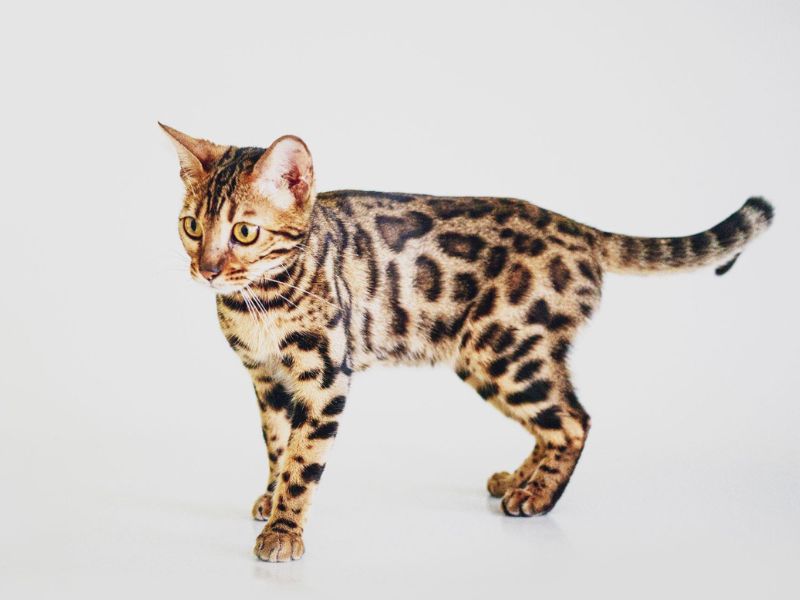
Just like any other domesticated cat, Bengal cats require routine veterinary care in order to stay healthy and prevent common diseases. Bengals are generally a healthy breed, but there are a few health conditions to be aware of.
Hip dysplasia is a condition that can affect Bengals, especially those with long backs and short legs. It occurs when the hip joint does not form properly, causing pain and lameness. Treatment typically involves weight management and pain medication.
Another potential health concern for Bengals is gingivitis or inflammation of the gums. This condition is often caused by poor dental hygiene and can lead to tooth loss if left untreated. To prevent gingivitis, brush your Bengal's teeth regularly and take them to the vet for regular dental checkups.
Lastly, Bengals are susceptible to kidney stones and urinary tract infections. These conditions are often caused by dehydration, so it's important to make sure your Bengal always has access to fresh water.
If you notice your Bengal straining to urinate or showing signs of pain when doing so, take them to the vet immediately, as these could be signs of a serious urinary tract issue.
Read : The 10 Most Common Cat Behaviors Explained
Where to Find Bengal Cats
If you're looking for a Bengal cat, your best bet is to check your local animal shelters or rescue organizations. Bengals are not typically found in traditional pet stores.
There are a number of Bengal-specific rescues across the country that may have cats available for adoption. The website bengalrescuenetwork.com has a directory of rescues that can help you find a Bengal in need of a home.
Another option is to contact breeders directly. A reputable breeder will be able to answer any questions you have about the breed and help you find a healthy, well-adjusted kitten or cat that will make a great addition to your family.
You can also check classified sites such as Craiglist or Kijiji to find Bengal cats that are looking for a home. However, be sure to do your research before adopting a pet from these sources to make sure you're getting a healthy cat and not supporting an irresponsible breeder.
Frequently Asked Questions

1. How much does a Bengal cat cost in Malaysia?
The price of a Bengal cat in Malaysia depends on the quality and age of the cat, as well as any additional accessories or supplies that come with it. Generally speaking, you can expect to pay between RM800 and RM2500 for a Bengal kitten in Malaysia.
2. Is a Bengal cat a good pet?
Yes, Bengals are a great choice as a pet. They are intelligent, affectionate, and loyal cats that make excellent family pets. They can be very active, so they need plenty of stimulation and playtime to stay happy and healthy.
3. What is the Bengal cat's temperament like?
Bengal cats are one of the largest domestic cat breeds, with males typically weighing 15-20 pounds and females 10-15 pounds. Bengals are also one of the most active and intelligent breeds of cats, making them both challenging and rewarding pets. Here are some frequently asked questions about Bengal cats to help you decide if this is the right breed for you:
4. How big do Bengal cats get?
Male Bengals typically weigh 15-20 pounds, while females weigh 10-15 pounds. However, some Bengals can grow even larger, so it’s important to consult with a breeder or veterinarian about the expected size before adopting one of these cats.
5. What is the Bengal cat's temperament like?
Bengals are very active and curious by nature, which can result in lots of playful "hunting" behaviour (like stalking and pouncing on toys). They also have a high intelligence level, which means they require stimulation and enrichment to stay happy and healthy.
For example, providing your Bengal with climbing trees or perches, as well as interactive toys that challenge their minds, will go a long way in keeping them content.
6. Why are Bengal cats so special?
Bengals are a distinct breed of cat that resulted from the careful breeding of domestic cats with Asian Leopard Cats (ALCs). As a result, Bengals are very distinct in appearance, with most having spotted or marbled coats and large, expressive eyes.
They also tend to exhibit "dog-like" behaviours like fetching and walking on a leash. Because of their wild ancestry, Bengals can make excellent pets for those who appreciate their unique traits.
7. Should Bengal cats be indoor cats?
Yes, Bengals should be kept as indoor cats to ensure their safety and health. Since they have a wild ancestry, Bengals may be more susceptible to certain diseases and parasites if allowed to roam outdoors.
Additionally, keeping them indoors will help protect local wildlife from any potential hunting or predation behaviours that your Bengal might display.
8. Are Bengals difficult to care for?
Bengals can be high-maintenance cats, requiring a great deal of physical and mental stimulation to stay healthy and happy. In addition to providing plenty of toys for exercise and playtime.
Bengals also need regular grooming sessions to help keep their coat in top condition. Finally, these cats require consistent training and socialization from an early age to ensure they are well-adjusted and well-behaved pets.
9. Do Bengal cats destroy the furniture?
Bengals can be very active and playful, so it is important to provide them with plenty of toys and climbing structures to keep them entertained. If they don’t have enough appropriate outlets for their energy, they may resort to inappropriate behaviours like scratching or clawing furniture.
Additionally, Bengals may become destructive if bored or lacking in mental stimulation. Therefore, it is important to ensure your Bengal receives adequate exercise and playtime, as well as socialization and training, from an early age.
10. What are the cons of owning a Bengal cat?
The main potential downside of owning a Bengal is the amount of time and energy that’s needed to keep them healthy and happy. Bengals are very active cats and require plenty of exercises, playtime, and mental stimulation to stay content.
Additionally, Bengals need regular grooming sessions to maintain their thick coats. Some owners may not be able to meet the demands of this breed, so it’s important to consider if you have the time or resources required before getting a Bengal.
11. Do Bengal cats like to be picked up?
Bengals may not always enjoy being picked up, as they prefer to be in control of their own movements. However, with patience and positive reinforcement, you can train your Bengal to accept and even enjoy being handled. It’s important to start gently and slowly, rewarding your cat for good behaviour with treats or praise.
12. What is the average lifespan of a Bengal cat?
The average lifespan of a Bengal cat is between 12 and 15 years, depending on overall health and diet. With proper nutrition and regular trips to the veterinarian, Bengals can live even longer.
13. Do Bengal cats bite?
Bengals, like any other cat, can bite if they feel threatened or scared. It is important to be aware of your Bengal’s body language and reactions to certain situations so that you can help avoid any undesirable behaviour. In addition, Bengals should be socialized from a young age to help them become comfortable in different environments and around new people.
Read : How to Prevent You Cat from Getting Sick
Conclusion
From its striking coat to its intelligence and trainability, there is a lot to love about the Bengal cat breed. Many pet owners all over the world adore Bengals because of their stunning appearances, engaging personalities, and distinctive traits.
Whether you're looking for an active companion or a beautiful conversation piece, this breed of feline may be just what you're looking for. If you think that the Bengal cat might be right for your household, do some research into local breeders in your area so that you can find exactly what you’re looking for! - Bukit Besi Blog